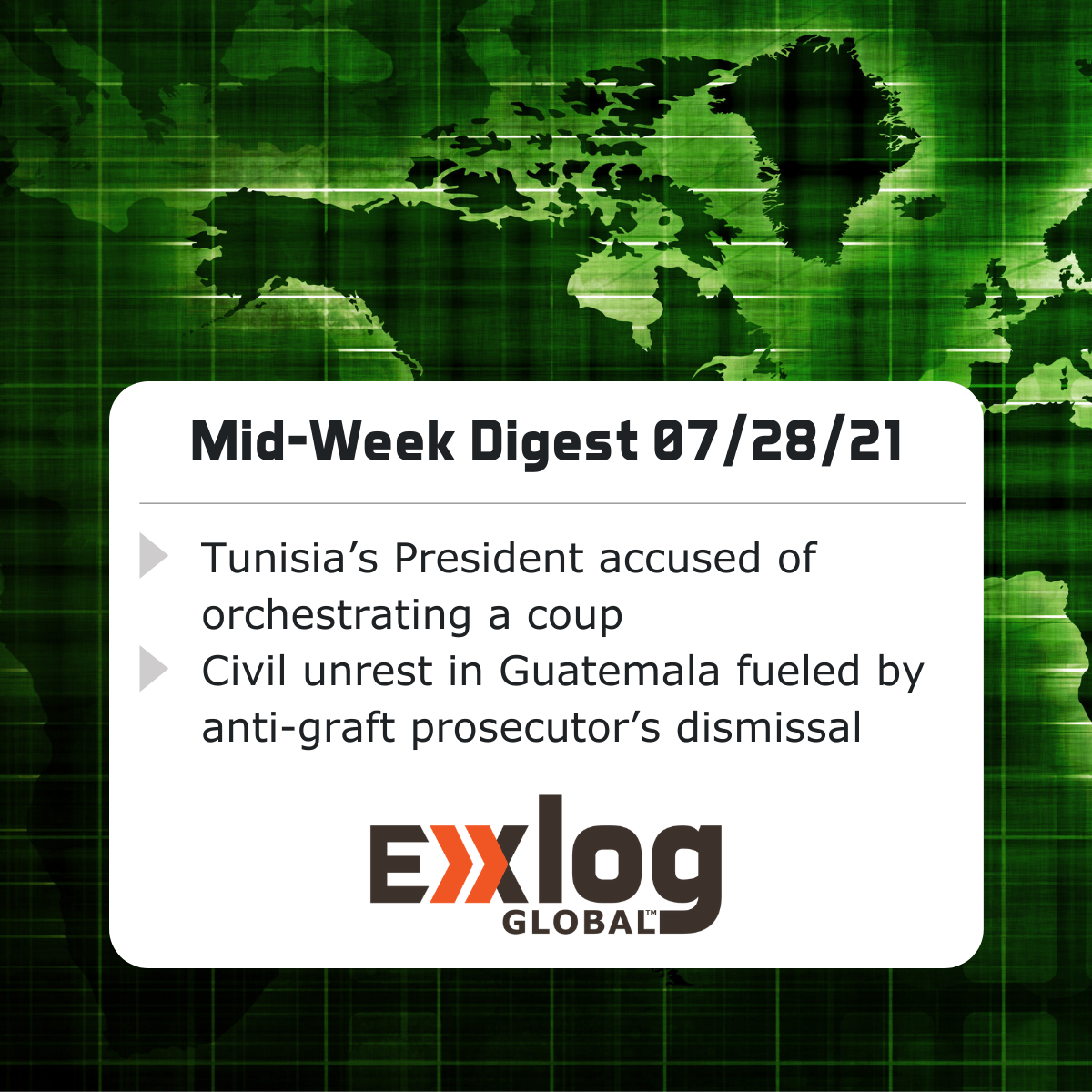Tunisia’s President accused of orchestrating a coup and Civil unrest in Guatemala fueled by anti-graft prosecutor’s dismissal
Tunisia: President assumes executive authority, triggering worst political crisis since 2011 revolution
A recent series of executive actions by Tunisian President Kais Saied have destabilized the country’s government and significantly increased the threat of large-scale unrest in the near term. On July 25, Saied fired Prime Minister Hichem Mechichi, invoked emergency constitutional powers, and froze parliament for 30 days. He also assumed control of the public prosecutor’s office and revoked lawmakers’ parliamentary immunity. Opposition parties have accused Saied of orchestrating a coup, but the President claims his actions were in accordance with Article 80 of the constitution which grants the country’s leader the authority to take “any measures” in case of “imminent danger.” However, other senior-level government officials have pushed back against Saied’s unilateral initiation of emergency measures, questioning the constitutionality of such a move.
Saied’s controversial initiative follows nationwide demonstrations calling for the dissolution of parliament; it also triggered another wave of pro-Saied protests, pointing to widespread anger and dissatisfaction with the country’s ruling political elite. Outside factors also fueling anti-government unrest include the COVID-19 pandemic, which caused the Tunisian economy to shrink by 8% in 2020, as well as chronically high inflation, unemployment, and corruption. While Saied’s anti-corruption rhetoric and popularity may give him an immediate advantage over his political rivals, dire economic conditions and the ongoing pandemic could force him to adopt deeply unpopular austerity measures – a move that would likely lead to worsening protests. Clashes between rival groups of demonstrators have thus far been limited, but escalation of civil unrest and violence in the short term cannot be ruled out as the political situation continues to develop.
Guatemala: Dismissal of anti-graft prosecutor fuels civil unrest and threatens international anti-corruption efforts
The recent dismissal of Guatemala’s top anti-corruption prosecutor has further damaged public confidence in the integrity of the country’s government – both domestically and internationally – and has triggered several days of protests in Guatemala City, Alta Verapaz, Peten, Escuintla and Totonicapán. Hundreds of Guatemalans took to the streets after the country’s Attorney General, María Consuelo Porras, dismissed prosecutor Juan Francisco Sandoval on July 23. The following day, demonstrators gathered in front of the presidential palace in Guatemala City to protest his dismissal and call for Porras’ resignation. Protests intensified on July 26 as demonstrators disrupted traffic on several inter-departmental highways and called for the resignation of President Alejandro Giammattei; they also denounced legal actions against Sandoval, endemic corruption in the country, and mishandling of the pandemic. On 29 July, activists allied with the indigenous organization the Xinca People’s Parliament plan to hold protests and labor strikes across the country to demand the resignations of the President and the Attorney General.
No violent incidents have been reported during the recent rallies, but clashes between demonstrators and security forces during any future protests cannot be ruled out. Sandoval headed the Special Prosecutor’s Office Against Impunity (FECI), which was part of the United Nations-backed International Commission Against Impunity in Guatemala (CICIG). Prior to his dismissal, the FECI was facing legal challenges aimed at declaring the unit unconstitutional. Sandoval’s removal highlights the difficulties of pursuing an anti-graft agenda in Central America; in response to the dismissal, the US State Department announced it would pause cooperation with Guatemala’s Public Ministry, citing the loss of “confidence in the attorney general and the intention to cooperate with the US government and fight corruption in good faith.” Further evidence of worsening corruption in the country could have longer-term repercussions for international aid and foreign business activity in the country.


